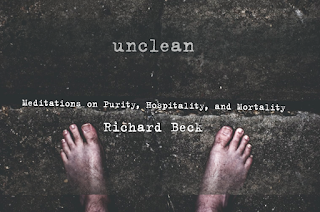Unclean is about the impact of disgust psychology upon religious communities. And on the surface it might not seem that disgust has a lot to do with church. It's been interesting, over the years, trying to share the insights of Unclean with congregations. Sermons that open with a discussion of disgust seem to strike most audiences as bizarre, weird, and coming out of left field. What does disgust have to do with me and my life?
Well, quite a lot, as Unclean argues. Disgust psychology, and in its manifestation as purity psychology, regulates huge swaths of our moral and social experience.
How so?
Unclean breaks into three big parts, discussions about "purity, hospitality, and mortality." Those areas correspond to morality, social relationships, and attitudes about the body. That is, disgust psychology affects how we think about right and wrong, Otherness, and our anxieties about bodily neediness and vulnerability. As I recount in Unclean, disgust, as a boundary-monitoring psychology, creates problems for faith communities across these three domains. I'd describe these problems as quarantine, dehumanization, and gnosticism.
When disgust regulates our moral lives it creates an impulse toward quarantine, erecting boundaries between ourselves and vectors of sin. Holiness is conceived of as a pure space that has to be vigilantly monitored. This impulse creates a challenge for those wanting to emulate Jesus's lifestyle of being "a friend of sinners," as the quarantining impulse pulls us in the opposite direction, toward the creation of a pure and holy group separated from the impure and unclean. To borrow from Miroslav Volf, the impulse toward moral quarantine causes the "will to purity" to trump the "will to embrace."
In the social domain, disgust is also implicated in dehumanization. As Martha Nussbaum has observed,
Disgust is all about putting the object at a distance and drawing boundaries. It imputes to the object properties that make it no long or a member of the subject's own community or world, a kind of alien species of thing...Thus, throughout history, certain disgust properties—sliminess, bad smell, stickiness, decay, foulness—have repeatedly and monotonously been associated with, indeed projected onto, groups by reference to whom privileged groups seek to define their superior human status.
Of course, the moral and social domains can overlap, where those deemed to be "sinners" are also dehumanized. But more often than not, stigmatized groups are simply deemed "less human" solely on account of their difference and otherness.
Finally, disgust is also implicated in gnosticism, a flight from the body into a hyper-spiritualized experience. The body, with this foulness, is deemed evil, bad, and corrupting in contrast to the spirit which is pure, good, and ennobling. Scandalously, our bodies link us to the beasts and animals where our spirits connect us to the angelic and heavenly. In my research I've called this gnostic anxiety "Incarnational ambivalence." As I describe in Unclean, this anxiety and ambivalence makes us inhospitable to bodies that display weakness, failure, need, and vulnerability--from the aged to those with disabilities to the mentally ill to the poor.
Quarantine, dehumanization and gnosticism. These are the impacts of disgust psychology upon the life of the church.


